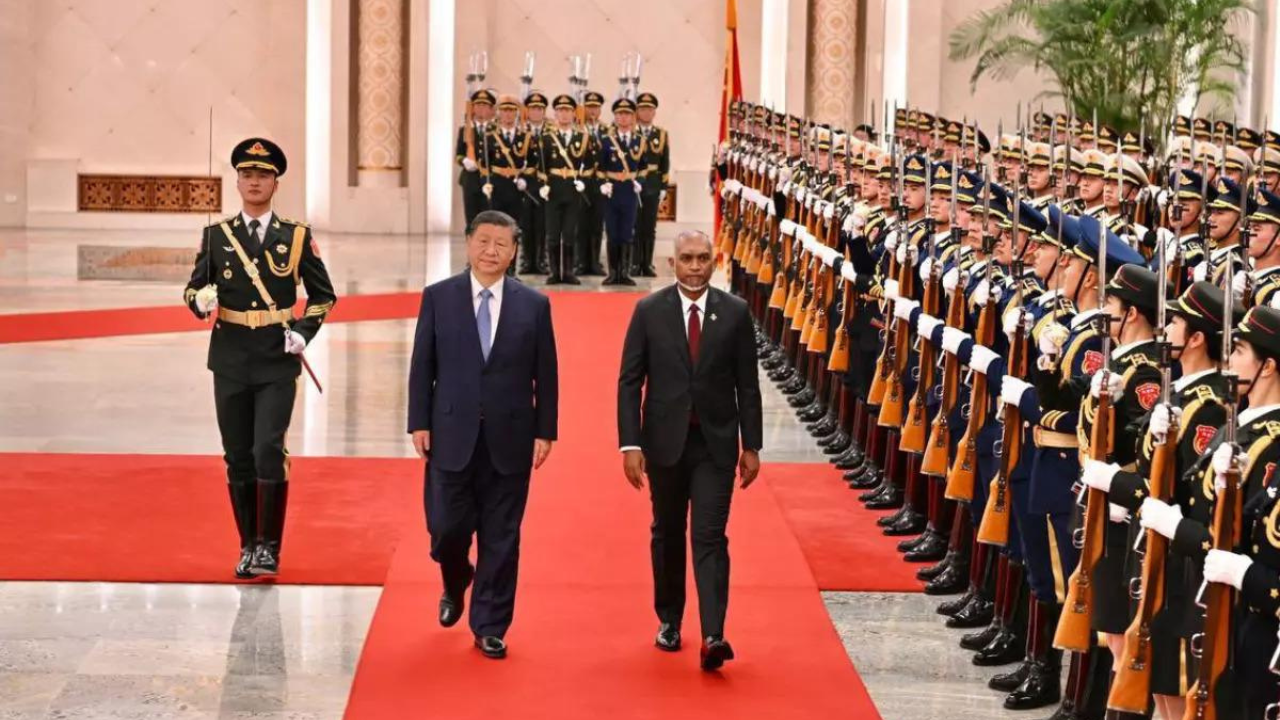China ships Tibetan glacier water to climate-threatened Maldives

[ad_1]
MALE: China has sent more than a million bottles of water from melting Tibetan glaciers to the Maldives, officials said Thursday, a gift from the world’s highest mountains to a low-lying archipelago threatened by rising seas.
The Indian Ocean nation of 1,192 tiny coral islands is on the frontlines of the climate crisis, with salt levels seeping into the land and corrupting potable water, leaving it dependent on desalination plants.
Scientists say glaciers in the Himalayas are melting faster than ever due to climate change.
The Maldives foreign ministry said the water was a gift from Yan Jinhai, the chairman of the Xizang Autonomous Region, or Tibet, lying more than 3,385 kilometres (2,100 miles) away on the far side of the world’s highest mountain range.
The consignment of mineral water packed into 90 sea containers arrived last week and had been unloaded in the capital Male, a port authority official said.
“The Chairman of Xizang Autonomous Region announced his wish to donate 1,500 tonnes of drinking water… during his official visit to the country in November,” the Maldives foreign ministry said in a statement.
– ‘Water shortage’ –
The ministry rejected allegations on social media that the imported water was for the consumption of pro-China President Mohamed Muizzu, who came to power last year on an anti-Indian platform.
“The government of Maldives has decided to utilise the water to provide assistance to islands in case of water shortage,” it said.
The United Nations Intergovernmental Panel on Climate Change (IPCC) warned in 2007 that rises of 18 to 59 centimetres (7.2 to 23.2 inches) would make the Maldives virtually uninhabitable by the end of the century.
Muizzu promises his country — 80 percent of which is less than a metre (three feet) above sea level — will beat back the waves through ambitious land reclamation and building islands higher.
The congested capital island of Male has already run out of groundwater for drinking and depends on expensive desalination plants to supply the local population.
A fire at the water purification plant in Male in December 2014 disrupted supplies for almost a week, causing panic.
Both India and China rushed ships to produce drinking water until the desalination plant was fixed.
Better known for its white sand beaches and luxury tourism, the Maldives also straddles strategic east-west international shipping routes.
New Delhi considers the Indian Ocean archipelago to be within its sphere of influence but the Maldives has shifted into the orbit of China — its largest external creditor.
Muizzu visited Beijing in January, when he signed a raft of infrastructure, energy, marine and agricultural deals, while India began withdrawing military personnel operating surveillance aircraft this month after they were ordered to leave.
The Indian Ocean nation of 1,192 tiny coral islands is on the frontlines of the climate crisis, with salt levels seeping into the land and corrupting potable water, leaving it dependent on desalination plants.
Scientists say glaciers in the Himalayas are melting faster than ever due to climate change.
The Maldives foreign ministry said the water was a gift from Yan Jinhai, the chairman of the Xizang Autonomous Region, or Tibet, lying more than 3,385 kilometres (2,100 miles) away on the far side of the world’s highest mountain range.
The consignment of mineral water packed into 90 sea containers arrived last week and had been unloaded in the capital Male, a port authority official said.
“The Chairman of Xizang Autonomous Region announced his wish to donate 1,500 tonnes of drinking water… during his official visit to the country in November,” the Maldives foreign ministry said in a statement.
– ‘Water shortage’ –
The ministry rejected allegations on social media that the imported water was for the consumption of pro-China President Mohamed Muizzu, who came to power last year on an anti-Indian platform.
“The government of Maldives has decided to utilise the water to provide assistance to islands in case of water shortage,” it said.
The United Nations Intergovernmental Panel on Climate Change (IPCC) warned in 2007 that rises of 18 to 59 centimetres (7.2 to 23.2 inches) would make the Maldives virtually uninhabitable by the end of the century.
Muizzu promises his country — 80 percent of which is less than a metre (three feet) above sea level — will beat back the waves through ambitious land reclamation and building islands higher.
The congested capital island of Male has already run out of groundwater for drinking and depends on expensive desalination plants to supply the local population.
A fire at the water purification plant in Male in December 2014 disrupted supplies for almost a week, causing panic.
Both India and China rushed ships to produce drinking water until the desalination plant was fixed.
Better known for its white sand beaches and luxury tourism, the Maldives also straddles strategic east-west international shipping routes.
New Delhi considers the Indian Ocean archipelago to be within its sphere of influence but the Maldives has shifted into the orbit of China — its largest external creditor.
Muizzu visited Beijing in January, when he signed a raft of infrastructure, energy, marine and agricultural deals, while India began withdrawing military personnel operating surveillance aircraft this month after they were ordered to leave.
Previous Post
An airstrip…Next Post
Venezuelans are…Amazon Free Membership Offers 2026…
February 1, 2026
10 Best AI Productivity Tools…
January 31, 2026


